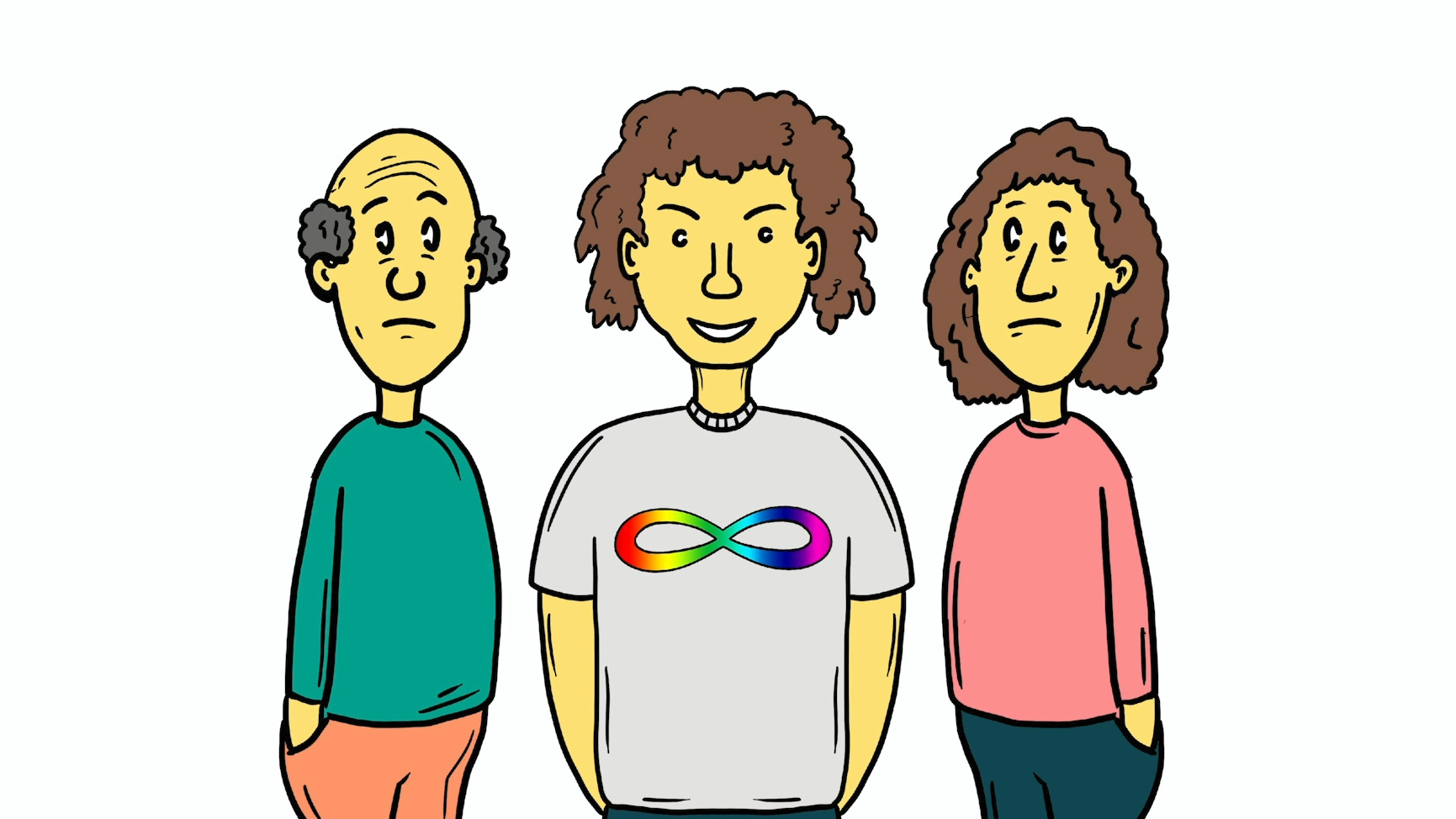
Tips to help support neurodivergent people
Not everyone takes on information in the same way, which is why it's important for all of us to be aware of who we are chatting with and think about the best way for us to make them feel heard and supported.
Research* has shown that autistic and neurodivergent people are more likely to experience anxiety and depression and be at risk of self-harm and suicide.
Neurodivergence is a word that describes people whose brain is thought to work differently to typical (neurotypical) people. There are a number of conditions that sit under the umbrella term of neurodivergence. Some of the more common ones that you may have heard of are Autism, Attention-Deficit/Hyperactive Disorder (ADHD), Tourette Syndrome, Dyslexia and other learning difficulties such as Dyscalculia, Dysgraphia and Dyspraxia/Developmental Coordination Disorder. Neurodivergent people may or may not also have an intellectual disability.
The resources below are designed to guide you on how to have an R U OK? conversation with your neurodivergent friends, family members and colleagues who might be struggling with life's ups and downs. By meaningfully connecting and lending support, we can help those we care about long before they're in crisis.
R U OK? is grateful to the Suicide Response Project who co-designed these resources with autistic people with lived experience of suicide as well as their families and those who supported them.
The videos on this page are designed to help you spot the signs a neurodivergent person might be struggling and feature practical tips about how you can support them.
FACT OR FICTION
This video addresses some common myths about those who are neurodivergent and about suicide including:
MYTH: Asking about suicide will plant the idea in someone's head.
FACT: For those having suicidal thoughts, this question can provide relief and validation, as someone has finally noticed their distress. For those not thinking about suicide, there is no evidence asking this question will plant the idea in their head.
MYTH: Neurodivergent people have no empathy and don’t care about the impact their self-harm and suicide attempts have on others.
FACT: Most autistic people have huge compassion, strong awareness and intense feelings. Telling them to think about the impact their suicide might have on others may not be helpful, as they can often feel like a burden. Instead, focus on alleviating stressors.
RISK FACTORS
We all go through life's ups and downs, and might experience financial difficulties, relationship breakdowns, health issues or the loss of someone or something we care about.
In addition to these, neurodivergent people can feel they are a burden to others or that their impact on others outweighs their worth. They might struggle more than their neurotypical peers with making and keeping friends, and might more strongly experience a sense of isolation.
Other risk factors include:
- bullying they might experience
- exhaustion /frustration from hiding or concealing their neurodivergent traits
- limited support and advocacy
- burnout from study, work, family or social commitments
If you notice these things, don't wait to act. Reach out , ask, 'are you OK?' and
have a conversation with them.
TRUST THE SIGNS
There are many warning signs that might indicate a neurodivergent person is struggling and in need of some extra support.
Things to look out for can include:
- them suddenly becoming very quiet or stopping communication
- a complete shutdown
- talking about death in a sombre tone, rather than curious
- an increase in drug or alcohol consumption
- becoming numb, accepting that bad things will happen and no attempt to make things better
- aggression
- self-harming behaviour
- skipping meals
- an increase in their consumption of media about death and suicide
By acting as ‘eyes and ears’ and reaching out to anyone who's going through a tough time, we can show them they’re supported and encourage them to access help if they need it.
INTERPRET WARNING SIGNS AND RISKS
It's important to trust the signs, trust your gut and start a conversation if you are worried about someone. Look out for changes in what they're saying, doing and their usual behaviour.
Asking about suicide won’t put the idea in their head. It can provide relief and give them a chance to talk and get help. It is always better to ask and be wrong than to not ask at all.
An autistic person may speak to you about suicide in a ‘matter of fact’ way. This is not because they are making fun or downplaying the situation or how they feel.
If they have chosen you to speak to, they likely feel comfortable speaking with you. Take them seriously, even if they appear relaxed.
WHO SHOULD I HELP?
You might have heard of the Bystander Effect. This is a consistently observed phenomenon in human behaviour that when someone needs help, most people do nothing due to hoping or assuming someone else will help. They might also avoid helping due to fear of:
- making the situation worse
- being made responsible for the outcome
- becoming responsible for the other person
- making a mistake
When you notice someone is at risk, don't wait for someone else to do something. Reach out, ask, 'are you OK?' and let them know you are there to support them.
If you aren't in the right headspace or aren't the right person to support them, that is absolutely OK. What you can do is find someone who can.
WHAT TO SAY AND DO
If the person is neurodivergent, get a sense of how they like to communicate and mirror that style (i.e. texting; phone calls; meeting in a park; during the morning as opposed to later in the day). Use a calm, non-judgmental, non-pressured approach.
Speak slowly and allow time for them to process and respond. Neurodivergent people can require longer time to process your questions/comments, organise their thoughts and plan and deliver their response. Don’t force eye contact and avoid interrupting them while they are thinking or talking as this can be distracting and distressing.
Autistic people may not understand the intent of your indirect questions and may benefit from being asked directly, 'have you been thinking about suicide?'.
Help them organise a GP/counselling appointment and offer to go with them. This is important if the person has anxiety and avoidance around making phone calls, communicating their needs or limited access to transport and support services.
Identify autism-trained, pro-neurodiversity/neurodiversity affirming or autistic professionals. It can also help to talk to the person who is struggling about what they might expect from the appointment, what sort of things to talk about or what they might be asked.
Some neurodivergent people might benefit from physical comfort (i.e., hug) or other sensory input/touch. Some might benefit from less input. Ask the person what is helpful for them. Other ideas to consider are reducing noise (move away or give them noise cancelling headphones) and reducing light (pull down blinds, dim or turn off lights, give them a hat or sunglasses).
MAKE A PLAN TO HELP
When supporting those we care about, it's not about finding the answers or solving their problems.
Make sure you're emotionally ready for the conversation, willing to genuinely listen, that you've set aside enough time and chosen a safe and comfortable place for the chat.
By asking them if they're OK, listening without judgement, encouraging them to take action and regularly checking in, we can help those we care about, long before they're in crisis.
It can help to set a reminder in your phone to call, text or check in with them.
You can find more tips about navigating an R U OK? conversation at our How to Ask page.
SUPPORT SERVICES AND TOOLS
If you, or someone you know, needs professional support, please contact your doctor, local health centre or one of the services listed below. Family and friends can also call upon these services for advice and assistance on how to support someone who is struggling with life. A full list of services can be found on our Find Help page.
If you are having suicidal thoughts, please seek assistance by contacting your trusted healthcare professional or calling Lifeline on 13 11 14 .
If you are concerned for your safety or the safety of others, seek immediate assistance by calling
Triple Zero (000) .
13 11 14
Call Lifeline 24/7 for crisis support and suicide prevention services. Text support is also available:
0477 13 11 14.
1300 22 4636
Call Beyond Blue 24/7 for advice, referral and support from a trained mental health professional.
1300 659 467
The Suicide Call Back Service offers 24/7 free counselling and support for people at risk of suicide, carers and bereaved.
Support Specific to Autism
Find information on understanding autism better, training opportunities, support groups for autistic people, NDIS advice, ideas for creating change in the community to respect the dignity of autistic people.
Get information about autism, assessment, diagnosis, schooling, employment, therapy services, workshops, etc.
Free, national autism helpline, providing information over phone, email and webchat. It supports autistic people, their families and carers, health professionals, researchers, teachers, employers and the broader community.
Free virtual sessions (phone or video) to talk to a peer if feeling lonely, isolated and/or stressed, who can listen and provide support (18+)
Find a playground for an autistic child aged 0-6.
























